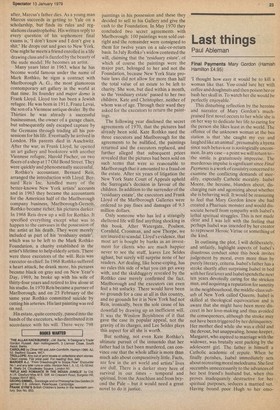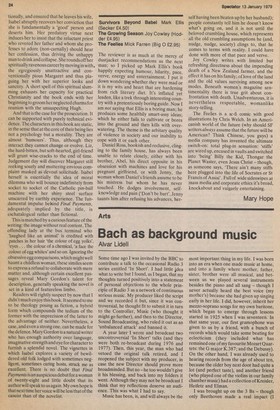Last things
Paul Ableman
Final Payments Mary Gordon (Hamish Hamilton £4.95) 'I thought how easy it would be to kill a woman like that. Youcould lure hcr with coffee and doughnuts and then poison her or bash her skull in. To watch her die would be perfectly enjoyable.'
This disturbing reflection by the heroine and narrator of Mary Gordon's muchpraised first novel occurs to her while she is on her way to dedicate her life to caring for the person she likes least in the world. The offence of the unknown woman at the bus station is that 'she caught my eye and laughed like an animal', presumably a hyena since such behaviour is zoologically uncommon. In any case — a point we will return to — 'the simile is gratuitously imprecise. The murderous impulse is significant since Final Payments is a work of casuistry concerned to examine the conflicting demands of morality, especially Catholic morality. Isabel Moore, the heroine, blunders about, discharging ruin and agonizing about whether she is behaving well. It would be reassuring to feel that Mary Gordon knew she had created a Pharisaic monster and would dissociate herself from sympathy with Isabel's lethal spiritual struggles. This is not made clear and I was left with the feeling that perhaps Isabel was intended by her creator to represent Heroic Virtue or something of the kind.
In outlining the plot, I will deliberately, and unfairly, highlight aspects of Isabel's disastrous conduct since this book invites judgement by moral, even more than by purely literary, criteria. Isabel's father has a stroke shortly after surprising Isabel in bed with her first lover and Isabel spends the next ten years devotedly caring for the stricken man, and acquiring a reputation for sanctity in the neighbourhood, the middle-class suburb of New York called Queens. Isabel is skilled at theological equivocation and is aware that she might have been more discreet in her love-making and thus avoided the consequences, although the stroke may not have been triggered by her delinquency. Her mother died while she was a child and the devout, but unappealing, house-keeper, Margaret, who aspired to marriage with the widower, was brutally sent packing by the adolescent girl. The father is himself a Catholic academic of repute. When he finally perishes, Isabel immediately sets about recreating moral melodrama. She first succumbs unneccessarily to the advances of her best friend's husband but, when this proves inadequately destructive for her spiritual purposes, seduces a married vet. Having bound poor Hugh to her emo tionally, and ensured that he leaves his wife, Isabel abruptly recovers her conviction that she is fundamentally a 'good' person and deserts him. Her predatory virtue next induces her to insist that the reluctant priest who revered her father and whom she professes to adore (non-carnally) should hear her confession, thus driving the unhappy man to drink and collapse. She rounds off her spiritually ravenous career by moving in with, the egregiously unattractive and conventionally pious Margaret and thus plaguing her with her superior looks and sanctity. A short spell of this spiritual slumming exhausts her capacity for practical Christianity and the book ends with her beginning to groom her neglected charms for reunion with the unsuspecting Hugh.
And that is the case for the prosecution. It can be supported with purely technical evidence. The characters in this book are static, in the sense that at the core of their being lies not a psychology but a morality. They are almost 'humours'. Thus, although they interact they cannot change or evolve. Liz, the hard-bitten, but soft-hearted, girl-friend will grunt wise-cracks to the end of time. Judgement day will discover Margaret still reeking sourly and muttering envious complaint masked as devout solicitude. Isabel herself is essentially the idea of moral dilemma who will bounce indefinitely from socket to socket of the Catholic pin-ball machine with her shiny steel surface unscarred by earthly experience. The fundamental impulse behind Final Payments, adequately implied by the title, is eschatalogical rather than fictional.
This is matched by a curious feature of the writing: the image without real content. The offending lady at the bus terminal who 'laughed like an animal' is credited with patches in her hair 'the colour of egg yolks', 'eyes. . . the colour of a chemical, 'a face the colour of egg whites' and so on. Ignoring the obsessive egg comparisons, which might well haunt a childless woman, these similes seem to express a refusal to collaborate with mere matter and, although certain excellent pas sages reveal Mary Gordon's talent for description, generally speaking the novel is set in a kind of featureless limbo, Readers will rightly suspect by now that I didn't much enjoy this book. It seemed to me to be theology posing as fiction, a hybrid form which compounds the tedium of the former with the imprecision of the latter to the advantage of neither. Nevertheless, a case, and even a strong one, can be made for the defence. Mary Gordon is a natural writer who has enough authority over language, imaginative strength and eye for character to furnish a splendid novel. The vignettes in which Isabel explores a variety of bewil dered old folk lodged with sometimes negligent, sometimes caring hosts, struck me as excellent. There is no doubt that Final Payments is an auspicious debut for a woman of twenty-eight and little doubt that its author will speak to us again. My own hope is that next time her voice will be less that of the casuist than of the novelist. Survivors Beyond Babel Mark Ellis (Secker £4.50) The Growing Season Joy Cowley (Hodder £4.95) The Feelles Mick Farren (Big 0 £2.95) The reviewer is as much at the mercy of dustjacket recommendations as the next man; so I picked up Mark Ellis's book happily expecting humour, hilarity, pace, verve, energy and entertainment. I put it down wondering whether they were mad or it is my wits and heart that are hardening from rich literary diet. It's inflated yet leaden, like a trek through interesting country with a pretentiously boring guide. Now I am not saying that Ellis is a boring man; he produces some healthily smart-assy ideas; which he either fails to cultivate or bores into the ground and then kills with overwatering. The theme is the arbitary quality of violence in society and our inability to cope with it or each other.
Daniel Ross, bookish and reclusive, clinging to the family house, has always been unable to relate closely, either with his brother, Abel, his direct opposite in his obsession with machines and love for his pregnant girlfriend, or with Jenny, the woman whom Daniel's friends assume to be his mistress but whom he has never touched. He dodges involvement, selfknowledge and pain (Don't be hurt', Jenny taunts him after refusing his advances, her self having been &eaten up by her husband); people constantly tell him he doesn't know what's going on, and it is not until the beloved crumbling house, which represents all the old crumbling assumptions he (and, nudge, nudge, society) clings to, that he comes to terms with reality. I could have done with more of that pace and verve.
Joy Cowley writes with limited but refreshing directness about the impending death of a New Zealand farmer, and the effect it has on his family; of love of the land and the old values surviving among new modes. Beneath women's magazine sentimentality there is true grit about confrontation with death. Unadventurous, it is nevertheless respectable, womanlike story-telling.
The Feelies is a sc-fl comic with good illustrations by Chris Welch. In an Americanish world of the future (why should SF writers always assume that the future will be American? Think Chinese, you guys) a media company has invented the ultimate switch-on: total plug-in sensation: 'stiffs' are wired up, encased in vaults and switched into 'being' Billy the Kid, Thongar the Planet Waster, even Jesus Christ — though, as someone says, 'There ain't many stiffs here plugged into the life of Socrates or St Francis of Assisi'. Full of wide sideswipes at mass media and corporate ethics it's broad, knockabout and vulgarly entertaining.
Mary Hope



































 Previous page
Previous page